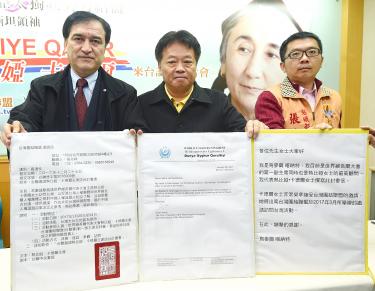World Uyghur Congress president Rebiya Kadeer has accepted an invitation from the Taiwan Solidarity Union (TSU) to visit Taiwan at the end of March, which would be the activist’s first visit to the nation.
The visit, if approved, would see Kadeer hold talks with Taiwanese activists and politicians about human rights, self-determination and independence.
In a video played at a news conference in Taipei yesterday, Kadeer expressed a deep interest in visiting Taiwan, and connecting with local activists and politicians, urging the government to give the green light to her visit.
“Taiwan is in unity with East Turkestan, Tibet and Southern Mongolia. We have to help each other, and exchange opinions and experiences at all times,” Kadeer said. “We support all the movements you launch in the name of freedom and we also need your support.”
She congratulated President Tsai Ing-wen (蔡英文) on her election victory last year and expressed support for Tsai’s administration.
Japan Uyghur Association president Ilham Mahmut said Kadeer had long been planning to visit Taiwan, but the administration of former president Ma Ying-jeou (馬英九) denied her entry in 2009, even though Kaohsiung Mayor Chen Chu (陳菊) had helped file a visa application for Kadeer’s participation at a film festival.
Having criticized the former administration’s treatment of the human rights activist, the Democratic Progressive Party (DPP), now in power, should be open to Kadeer’s visit, Mahmut said.
Though enshrined in China’s constitution, religious freedom is not allowed in reality, with conflicts between Uighurs and Chinese authorities often resulting from forceful intervention in religious practices, such as growing a beard and wearing a hijab, he said.
Press freedom is also prohibited and China’s state-run news outlets only publish stories that demonize Uighurs as terrorists, he added.
While China sources one-third of its energy from East Turkestan, about 90 percent of Uighurs are farmers and are living in poverty, he said.
“Should Uighurs not resist [China] under those circumstances?” he asked. “We are not different from Taiwanese. We are not different from people in other countries. We yearn for freedom and hope to run our own country on our ancestral lands.”
Kadeer’s visit would forge a bond between people subject to China’s suppression such as Uighurs, Taiwanese, Tibetans, Mongolians and Hong Kongers, TSU Chairman Liu I-te (劉一德) said.
Local pro-independence groups are generally indifferent to independence movements in other nations, but collaborating with foreign independence groups is necessary to counter China, Liu said.
“The TSU will stand together with the so-called separatist groups and help them resist Chinese imperialism,” Liu said.
The government should forsake the Constitution’s territorial claim on China — including Xinjiang, Inner Mongolia, Tibet and the South China Sea — and draw a clear line between Taiwan and China, he added.
Presidential Office spokesman Alex Huang (黃重諺) yesterday said any individual’s visa application would be handled by the concerned government agencies in accordance with the relevant regulations.
Additional reporting by CNA
Source: Taipei Times - 2017/01/25





















